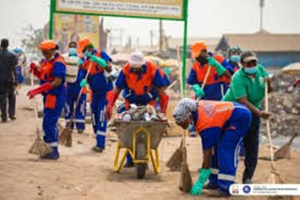Ho, Sept. 29, GNA - About 63 per cent of mothers in Ghana do not wash their hands with soap after disposing their children's faeces or visiting the toilet.
This is due to laziness and the perception that children's faeces are not harmful, situations that results in many deaths of children below five years, through diarrhoea.
Mrs Theodora Adomako-Adjei, Community Water and Sanitation Agency (CWSA) Extension Services Coordinator, made the observation at a day's orientation for strategic stakeholders on hand washing with soap ahead of Global Hand Washing Day celebration next month, on Wednesday in Ho. She said about 72 per cent of children also do not wash their hands after defecating, going by examples of their parents or guardians. Mrs Adomako-Adjei observed that many Ghanaian public toilets were unsightly and that one needed a "certificate in gymnastics" to jump over gobs of excreta to get to the toilets.
She said children use those places as play grounds and get back home to eat without washing their hands with soap. Mrs Adomako-Adjei asked Ghanaians to wash their hands with soap after visiting the toilet or handling another person's toilet. She noted that the country could meet the Millennium Development Goal Four to significantly reverse child deaths, if hand washing with soap moved from being an abstract good idea to an automatic behaviour. "This would reduce diarrhoea by 45 per cent and also reduce respiratory diseases drastically," Mrs Adomako-Adjei said. She said that hand washing with soap could help prevent the transmission of diseases from one person to the other directly or indirectly.
Mr Emmanuel F. Boateng, Regional Director of CWSA, noted that most Ghanaians only "wet" their hands before eating but wash them with scented soap after eating.
Mama Attratoh II, Queen mother of Ho-Dome, said hand washing was the most effective yet inexpensive way of preventing diseases and called on the citizenry to develop the habit of washing their hands with soap.
General News of Wednesday, 29 September 2010
Source: GNA












